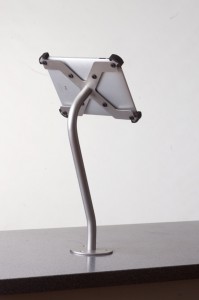Hey friends,
Check out our new division created solely to serve Craft Breweries and Distilleries.
Hey friends,
Check out our new division created solely to serve Craft Breweries and Distilleries.
 Recently, taproom POS (point of sale) questions keep appearing up on my radar. More specifically, people want to know which tablet application is best for their taproom. Within the last 5 years many POS startups have moved in and commanded respect in the space. The introduction of the tablet in business, coupled with these subscription POS systems has granted increased access to reputable/respectable products. One major benefit of using a iPad or Android device as a POS is the up-front investment. Compared to a traditional POS, the “price to play” is about 1/3rd. Most tablet based POS systems’ have a monthly subscription pricing structure, often with the only upfront cost being the hardware. (*Note many are now using the hardware as a giveaway to win the business) A traditional POS system can cost between $10-15K when you factor in all the hardware and printer paper? Printer paper? WGAS about printer paper you ask; trust me it all adds up.
Recently, taproom POS (point of sale) questions keep appearing up on my radar. More specifically, people want to know which tablet application is best for their taproom. Within the last 5 years many POS startups have moved in and commanded respect in the space. The introduction of the tablet in business, coupled with these subscription POS systems has granted increased access to reputable/respectable products. One major benefit of using a iPad or Android device as a POS is the up-front investment. Compared to a traditional POS, the “price to play” is about 1/3rd. Most tablet based POS systems’ have a monthly subscription pricing structure, often with the only upfront cost being the hardware. (*Note many are now using the hardware as a giveaway to win the business) A traditional POS system can cost between $10-15K when you factor in all the hardware and printer paper? Printer paper? WGAS about printer paper you ask; trust me it all adds up.
Here are some questions I have seen lately:
So why scrap the old skewl cash register?
Couple of reasons: 1) Depending on how you set up your items, super useful reports can be generated on what is selling and what is not. 2) Cash controls are far better with a POS. 3) A frekin iPad looks cool in the taproom.
Which one should I get?
I have played with many subscription based POS systems and while the prices are sweet, the functionality may not jive with your processes. For example, Vend, Shopkeep, SalesVu, Square, are all considered retail POS systems. This would be perfect if you were just a packing store,; but if your people are drinking onsite (host onsite consumption space), creating tabs may give you a issue. **Breadcrumb is one true restaurant POS that falls in the subscription space. These systems usually have a free trial. My suggestion would be to sign up, test, and see if it works for your space.
What about the big boys, they all seem to have tablet options now?
Micros, Aloha, Calypso have all rolled out some tablet version of their software. Problem is they are all still expensive. Look, if you are pulling down $150-200k and have multiple terminals in your taproom, then the big boys is the way to go.
Conclusion:
Subscriptions based POS systems are here to stay and tablets are making them a viable option for the taproom. With all the options out there, you may need to test a few or get with a expert who is going to help you pick on that will fit in your processes.
The next phase in brewery development is what I call “the commitment.” Capital is committed, a location is committed, equipment is committed and en-route, construction starts and anxiety sets in. You are actually doing this! Along with your commitment to brewing awesome beer, you also have a commitment to your financial fitness. Bookkeeping, payroll, brewers reports, tank labels, and brewing & packing schedules are a FEW of the items you must keep in order to ensure your fitness. **I caution new breweries not to skimp on the back office expense for the sake of saving a few dollars in the beginning.** The old adage “you get what you pay for” also applies to the accounting and consulting world. After reading the remote accountant reviews, and coming to a conclusion, here are a few steps to take that ensures that your back office is in order:
Your commitment to financial fitness is as important as the beer you produce!
Potential interview questions:
To keep up the momentum of the last post I have come up with a list of five “thought points” a potential brewery should consider while planning their arrival; enjoy:
West Coaster’s bear with me; Midwesterners please be patient. I know what I am about to say is SO a decade-old for yall, but here I go. I am excited about craft brewing!!! This industry is less than 5 years old to my wonderful city, and the momentum is not slowing. While I love beer, my excitement stems from the contribution these businesses are having on the US economy.
Two years ago I was given the awesome opportunity to help open a local brewery. While I spend most my time in the back office, I can feel the energy. The smells, employees, fork-lifts, tanks, patrons, all exude positive energy. What makes craft breweries so exciting? I came up with a few thoughts:
Craft Breweries are here to stay. The economic development they bring to cities is awesome and communities love them. This excitement is why I love to serve the industry.